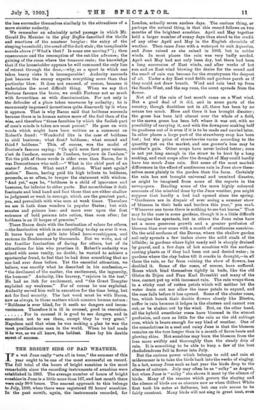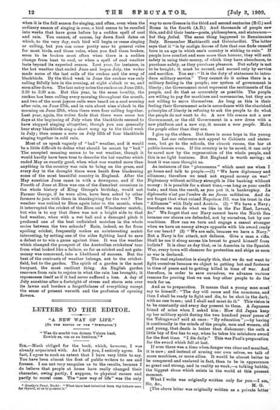THE BRIGHT SIDE OF BAD WEATHER.
JF a wet June really "sets all in tune," the summer of this year ought to be one of the most successful on record. The full total of the hours of bright sunshine is the most remarkable since the recording instruments of sunshine were eitablished in 1883. The average number of hours of bright sunshine in June is a little more than 167, and last month there were only 90-8 'hours. The nearest approach to this belongs to July, 1888, when there were registered 92 hours' sunshine. In the past month, again, the instruments recorded, for
Irsonslon, actually seven sunless days. The curious thing; er perhaps the natural thing, is that this record follews on two months of the brightest sunshine. April and May together held a larger number of Sunny days than stand to the credit sd' any other April and May in the English chronicle of weather. Then came Juno with a waterpot to eta Aquarius, and June rained as she rained in 1903, but in colder winds. In most places the rain was very badly needed. .A.pril and May had not only been dry, but there had been a long succession of East winds, and after 'weeks of hot sun and an East wind blowing the desire for the sound and the smell of rain can become for the sesuntryman the deepest of all. Under a dry East wind fields and gardens parch as if they could not draw breath. Wind and rain beat up from the South-West, and the sap runs, the scent spreads from the flower.
Not all of the rain of last month came on a West wind. But a good deal of it- did, and in some parts ef the country, though doubtless not in all, there has been by no means too much. Here and there it has brought disaster ; the grass has been laid almost over the whole of a field, 9r the mown grass has been left where it was gut, with no possibility of carrying it, and with the downpour soaking half its goodness out of it even if it is to be made and carried later. In other places a large part of the strawberry crop has been lost; but the price of strawberries -varies according to the quantity put on the market, and one grower's loss may be another's gain. Other crops have never looked better ; corn is not yet long enough in the straw to be hurt by a long soaking, and root crops after the drought of May could hardly have too much June rain. But some of the most marked differences in the effect of continuous rain in June show them- ;elves more plainly in the garden than the farm. Certainly the rain has not brought universal and unmixed disaster, as might be imagined from some of the reports in the newspapers. Reading some of the more highly coloured accounts of the mischief done by the June weather, you might suppose that hardly a bud had opened since the spring. "Gardeners are in despair of ever seeing a summer show a blossom in their beds and borders this year," you read, "Wherever one turns there is nothing to see but leaves." That may be the case in some gardens, though it is a little difficult to imagine the spectacle, but in others the June rains have set a more generous growth and a greater profusion of blossom than ever come with a month of continuous sunshine. On the arid surfaces of the Downs, where the shallow garden soil only spreads a few inches above the solid chalk of the hillside; in gardens where light sandy soil is sharply drained by gravel, and -a few days of hot sunshine wilt the surface- rooting plants as if they had been cut and denied water; in gardens where the clay bakes till it cracks in drought,—in all these the rain, so far from ruining the show of flowers, has doubled it. Some of the roses, of course, have suffered. Roses which bind themselves tightly in buds, like the old Gloire de Dijon and Fran Karl Druschki and many of the teas, cannot put up with incessant rain. The rain wraps them in a sticky coat of rotten petals which will neither let the water drain out nor allow the inner petals to expand, and the rose falls before it has opened. Some of the cluster roses, too, which bunch their double flowers closely like Electra, suffer in rain because it lodges in the clusters and cannot run out, or be shaken out by the wind. But, on the other hand, all the hybrid sweetbrier roses have bloomed in the utmost profusion, and care as little for the rain as the old cabbage rose, which is brave enough for any kind of weather. One of the consolations in is cool -and rainy June is that the blossom remains on the tree longer than in a month of fierce heats and glowing skies. Hot sunshine may burn the blossom from the tree more swiftly and thoroughly than the steady drip of rain. It is something to be able to keep a few of the best rhododendrons full in flower into July.
But the curious power which belongs to cold and rain at midsummer is to take the birds back into the weeks of singing. In a hot, sunny June such as last year the birds drop to the silence of autumn. July may often be as "sulky" as August, but when June is " sulky " she shelve it most by the silence of birds. Many of the reasons which govern the singing and -the silence of birds are as obscure now as when Gilbert White first took his notes at Selborne, but one rule seems to be fairly constant. Many birds will not sing in great heat, even
when it is the full season for singing, and often, even when the ordinary season of singing is over, a bird seems to be recalled into weeks that have gone before by a sudden spell of cool and rain. You cannot, of course, lay down fixed dates on which, to the very day, each bird will begin or cease singing or calling, but you can come pretty near to general rules for most birds, and those rules, when you find them broken, seem to be broken most often when there is a sudden change from beat to cool, or when a spell of cool weather lasts beyond its expected season. Last year, for instance, in the hot weather that ended June and began July, the writer made notes of the last calls of the cuckoo and the song of blackbirds. By the third week in June the cuckoo was only calling fitfully late in the evening, at eight o'clock or so, and soon after dawn. The last entry notes the cuckoo on June 24th, 3.10 to 3.30 a.m. But this year, in the same locality, the cuckoo has been calling every morning throughout the month, and two of the most joyous calls were heard on a cool evening after rain, on June 27th, and in rain about nine o'clock in the morning on June 29th, when there were four calling together. Last. year, again, the writer finds that there were some ten days at the beginning of July when. the blackbirds seemed to have stopped singing altogether, though you can generally hear stray blackbirds sing a short song up to the third week in July; then comes a note on July 12th of four blackbirds singing together in cold rain.
Most of us speak vaguely of "bad" weather, and it would be a little difficult to define what should be meant by "bad." The accepted meaning seems to be wet weather, though it would hardly have been true to describe the hot weather which ended May as exactly good, when what was wanted more than anything in the country was rain to bring on the grass, and every day in the drought there were heath fires blackening some of the most beautiful country in England. After the May sunshine June came in with a downpour, and if the Fourth of June at Eton was one of the dismalest occasions in the whole history of King George's birthday, would not Farmer George, if be were alive, have been asked by other farmers to join with them in thanksgiving for the wet ? The weather was unkind to Eton again later in the month, when it interrupted the cricket of the Eton and Winchester match; but who is to say that there was not a bright side to that bad weather, when with a wet ball and a damaged pitch it produced one of the best unfinished matches in the whole series between the two schools ? Rain, indeed, so far from spoiling cricket, frequently makes an uninteresting match interesting, by setting one of the sides fighting hard to save a defeat or to win a game against time. It was the weather which changed the prospect of the Australian cricketers' tour from what looked like a failure, so far as cricket and not gate. money was concerned, into a likelihood of success. But the best of the contrasts of weather belongs, not to the cricket- field, but to the garden. The spirit of a garden is the most buoyant, the most resilient thing. An English garden recovers from rain to rejoice in what the rain has brought; it repossesses itself as if it had never suffered a loss. A day of July sunshine after a fortnight of stress and storm sets over its lawns and borders a forgetfulness of everything except the sense of present warmth and the profusion of opening flowers.















































 Previous page
Previous page